If a tire goes flat, avoid further tire and wheel damage by driving slowly to a level place. Turn on your hazard warning flashers.
Caution: Changing a tire can be dangerous. The vehicle
can slip off the jack and roll over or fall on you or other people. You and they could
be badly injured or even killed. Find a level place to change your tire. To help prevent
the vehicle from moving:
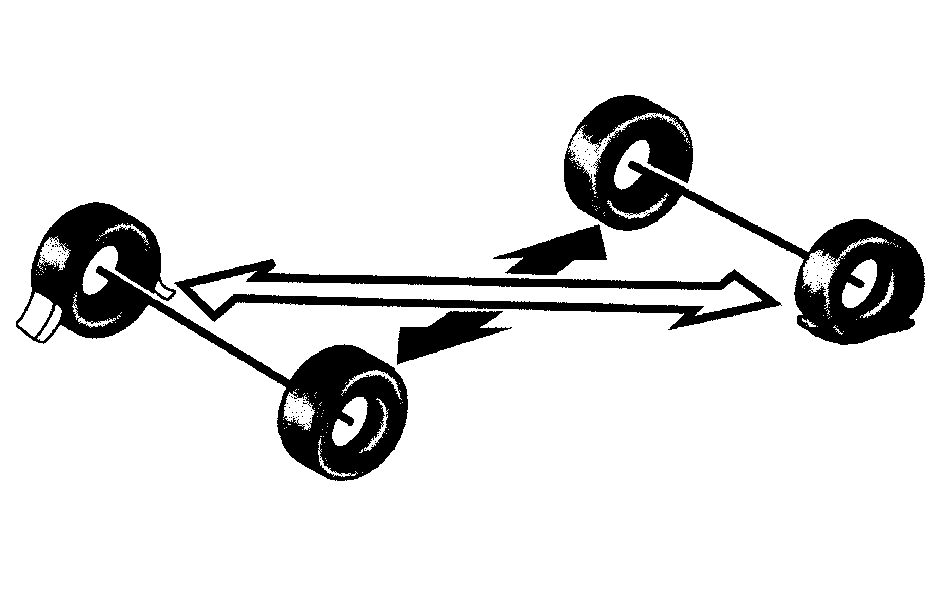
The following steps will tell you how to use the jack and change a tire.
Removing the Spare Tire and Tools
-
Yukon Denali (Rear Access Panel)
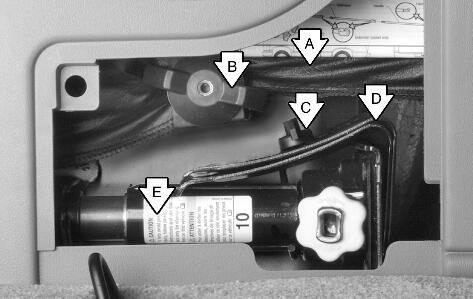
Tool Kit with Jack Tools and Gloves
Retaining Bracket and Wing Nut
Wing Nut Holding Wheel Blocks
Wheel Blocks
Bottle Jack
-
Yukon XL Denali
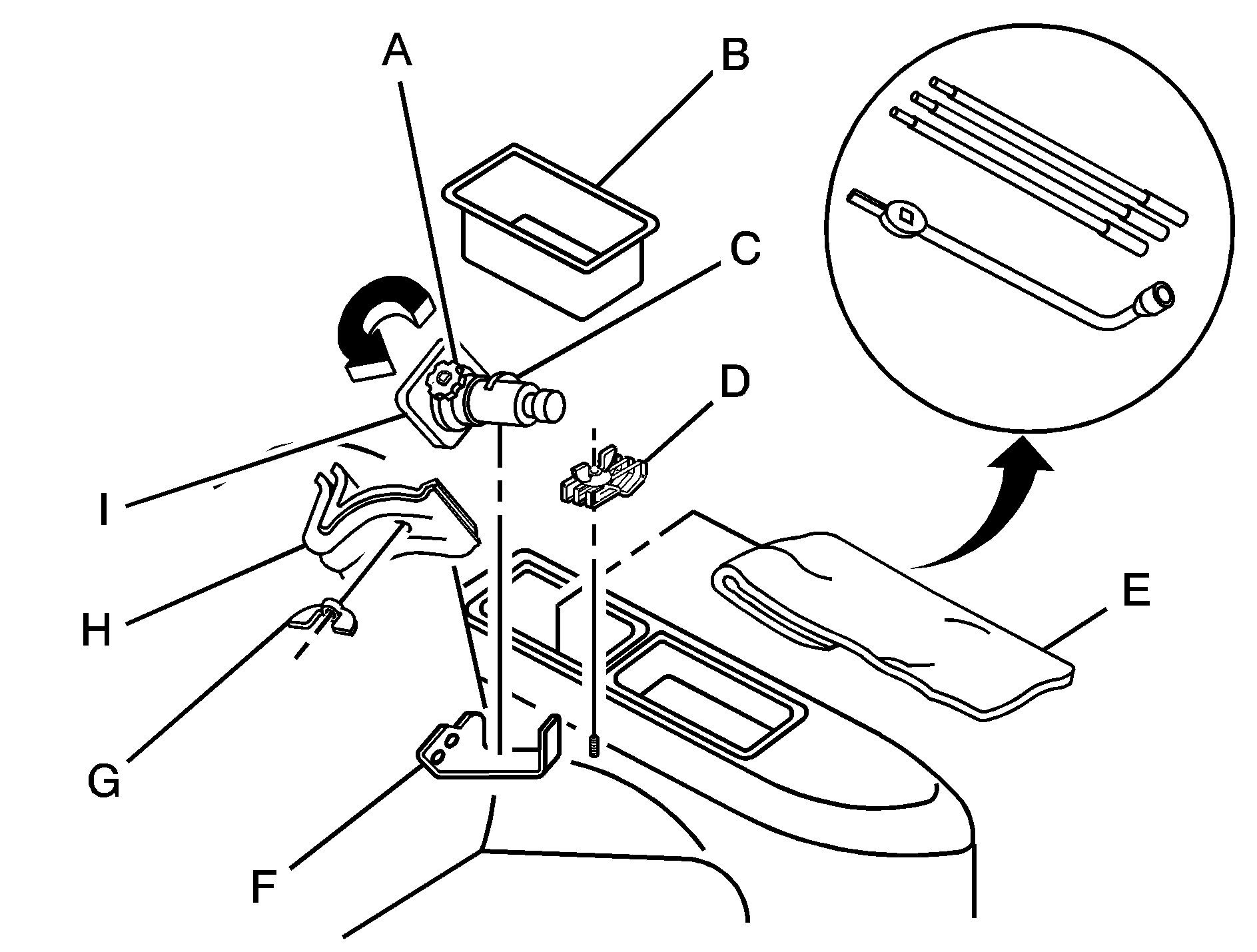
Bottle Jack
Wheel Blocks
Wing Nut Holding Wheel Blocks
Mounting Bracket
Removable Tray
Retaining Hook
Retaining Bracket and Wing Nut
Tool Kit with Jack Tools and Gloves
For Yukon Denali, the equipment is located behind the left trim panel in the rear of the vehicle. Unlatch the release lever to open the trim panel door. Skip the first step and follow the last three.
For Yukon XL Denali, the equipment you'll need is under the storage tray in the left trim panel.
- Remove the tray to access the tools.
- There is a wing nut used to retain the tool kit. To remove it, turn the wing nut counterclockwise.
- To release the bottle jack from its holder, turn the knob on the bottle jack counterclockwise to lower the jack head.
- The wheel blocks and the wheel block retainer can be removed by turning the wing nut counterclockwise.
You'll use the jack handle extensions and the wheel wrench to remove the underbody-mounted spare tire.
-
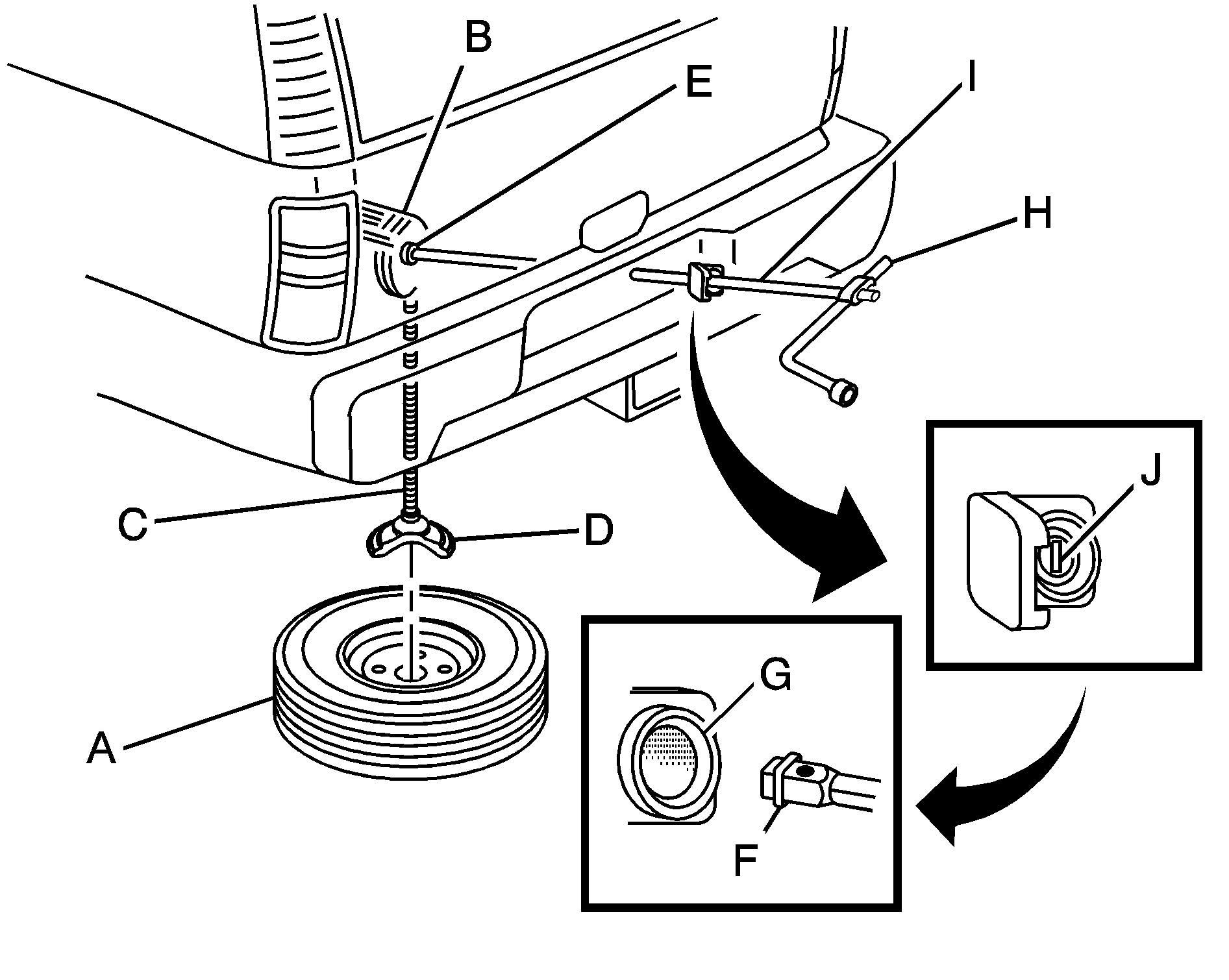
Spare Tire (Valve Stem Pointed Down)
Hoist Assembly
Hoist Cable
Tire Retainer
Hoist Shaft
Hoist End of Extension Tool
Hoist Shaft Access Hole
Wheel Wrench
Jack Handle Extensions
Hoist Lock (If Equipped)
- If your vehicle is equipped with a hoist lock (J), open the spare tire lock cover on the bumper and use the ignition key to remove the lock.
- Assemble the wheel wrench (H) and the two jack handle extensions (I) as shown.
- Be sure the hoist end of the extension connects into the hoist shaft (E). The ribbed square end of the extension is used to lower the spare tire.
- Turn the wheel wrench (H) counterclockwise to lower the spare tire to the ground. Continue to turn the wheel wrench until the spare tire can be pulled out from under the vehicle.
- The wheel wrench has a hook that allows you to pull the hoist cable towards you to assist in reaching the spare tire.
- When the tire has been lowered, tilt the retainer (D) at the end of the cable so it can be pulled up through the wheel opening.
- Put the spare tire near the flat tire.
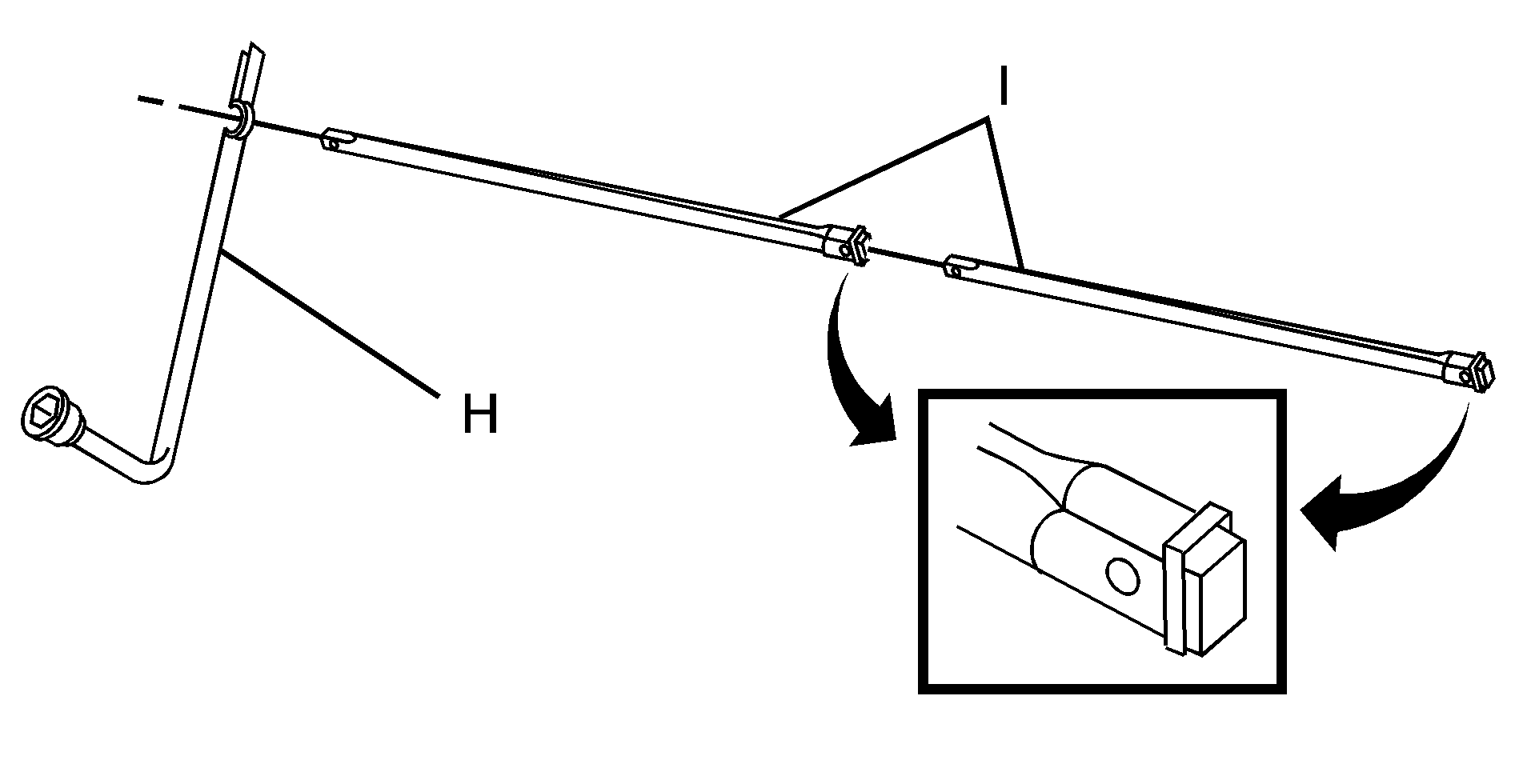
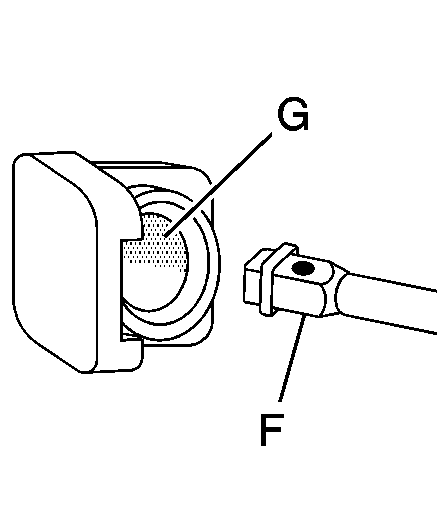
Insert the hoist end (open end) (F) of the extension through the hole (G) in the rear bumper.
If the spare tire does not lower to the ground, the secondary latch is engaged causing the tire not to lower. See "Secondary Latch System" later in this section.
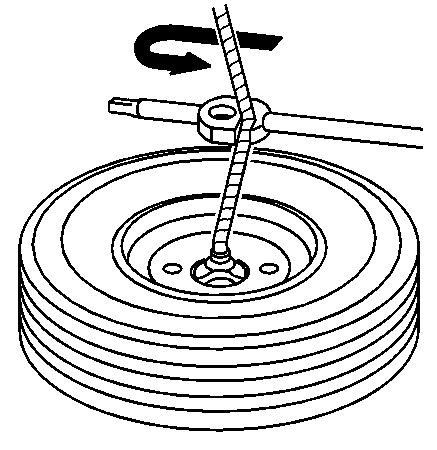
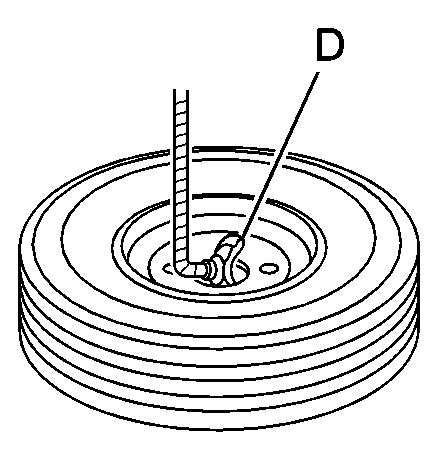
Removing the Flat Tire and Installing the Spare Tire
Use the following pictures and instructions to remove the flat tire and raise the vehicle.
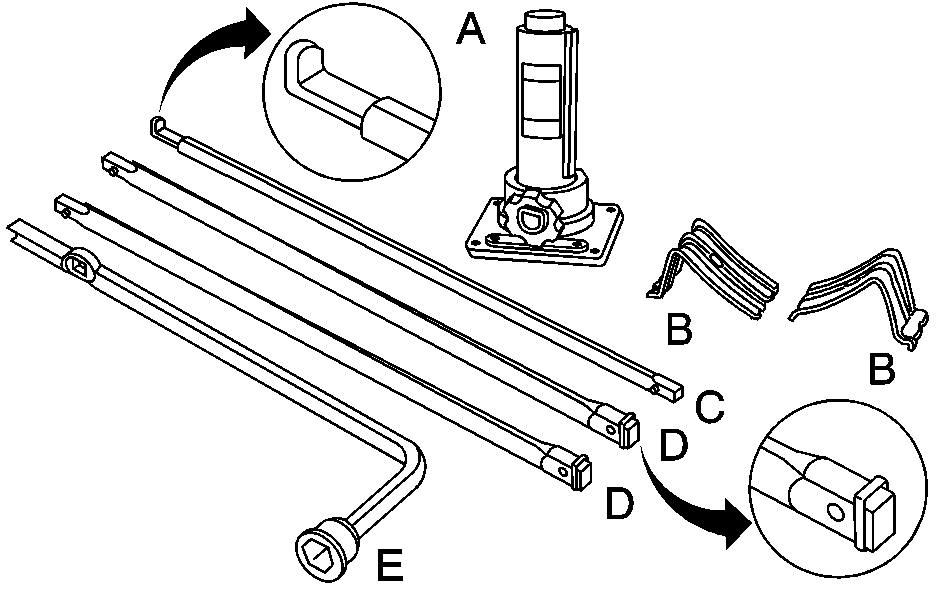
The tools you'll be using include the bottle jack (A), the wheel blocks (B), the jack handle (C), the jack handle extensions (D), and the wheel wrench (E).
- Remove the center cap by placing the chisel end of the wheel wrench in the slot on the wheel and gently prying the cap out.
- Use the wheel wrench to loosen all the wheel nuts. Turn the wheel wrench counterclockwise to loosen the wheel nuts. Don't remove the wheel nuts yet.
- A: Front Position
- Position the jack under the vehicle.
- Front Tire Flat: If the flat tire is on a front tire of the vehicle, you'll need to use the jack handle (C) and only one jack handle extension (D). Attach the wheel wrench to the jack handle extension. Attach the jack handle to the jack. Position the jack on the frame behind the flat tire where the frame sections overlap. Turn the wheel wrench clockwise to raise the vehicle. Raise the vehicle far enough off the ground so there is enough room for the spare tire to clear the ground.
- Rear Tire Flat: If the flat tire is on a rear tire of the vehicle, you'll need to use the jack handle (C) and both jack handle extensions (D). Attach the wheel wrench to the jack handle extensions. Attach the jack handle to the jack. Use the jacking pad provided on the rear axle. Turn the wheel wrench clockwise to raise the vehicle. Raise the vehicle far enough off the ground so there is enough room for the spare tire to clear the ground.
- Remove all the wheel nuts and take off the flat tire.
- Remove any rust or dirt from the wheel bolts, mounting surfaces and spare wheel.
- After mounting the spare, put the wheel nuts back on with the rounded end of the nuts toward the wheel. Tighten each wheel nut by hand. Then use the wheel wrench to tighten the nuts until the wheel is held against the hub.
- Turn the wheel wrench counterclockwise to lower the vehicle. Lower the jack completely.
- Tighten the nuts firmly in a crisscross sequence as shown by turning the wheel wrench clockwise.
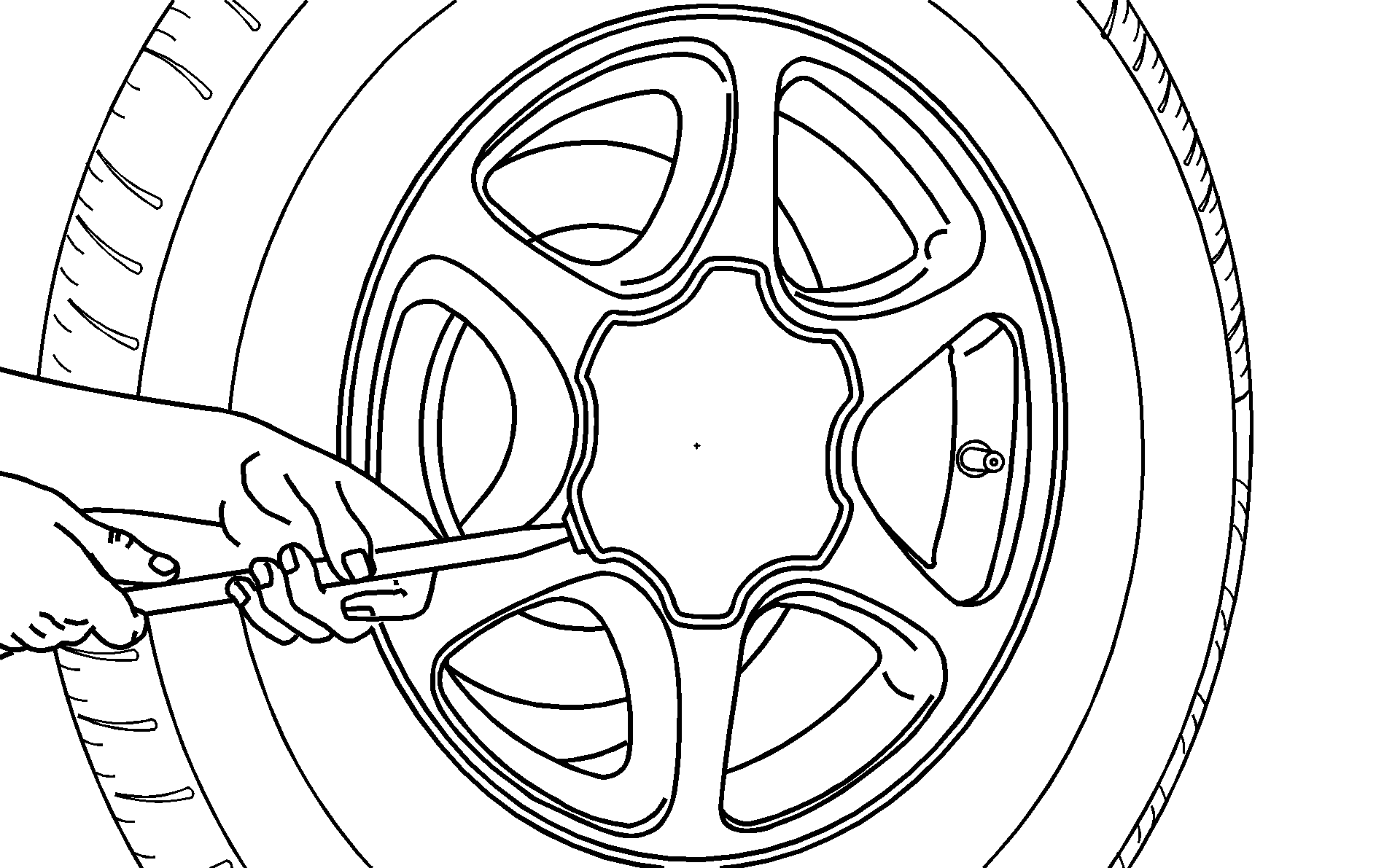
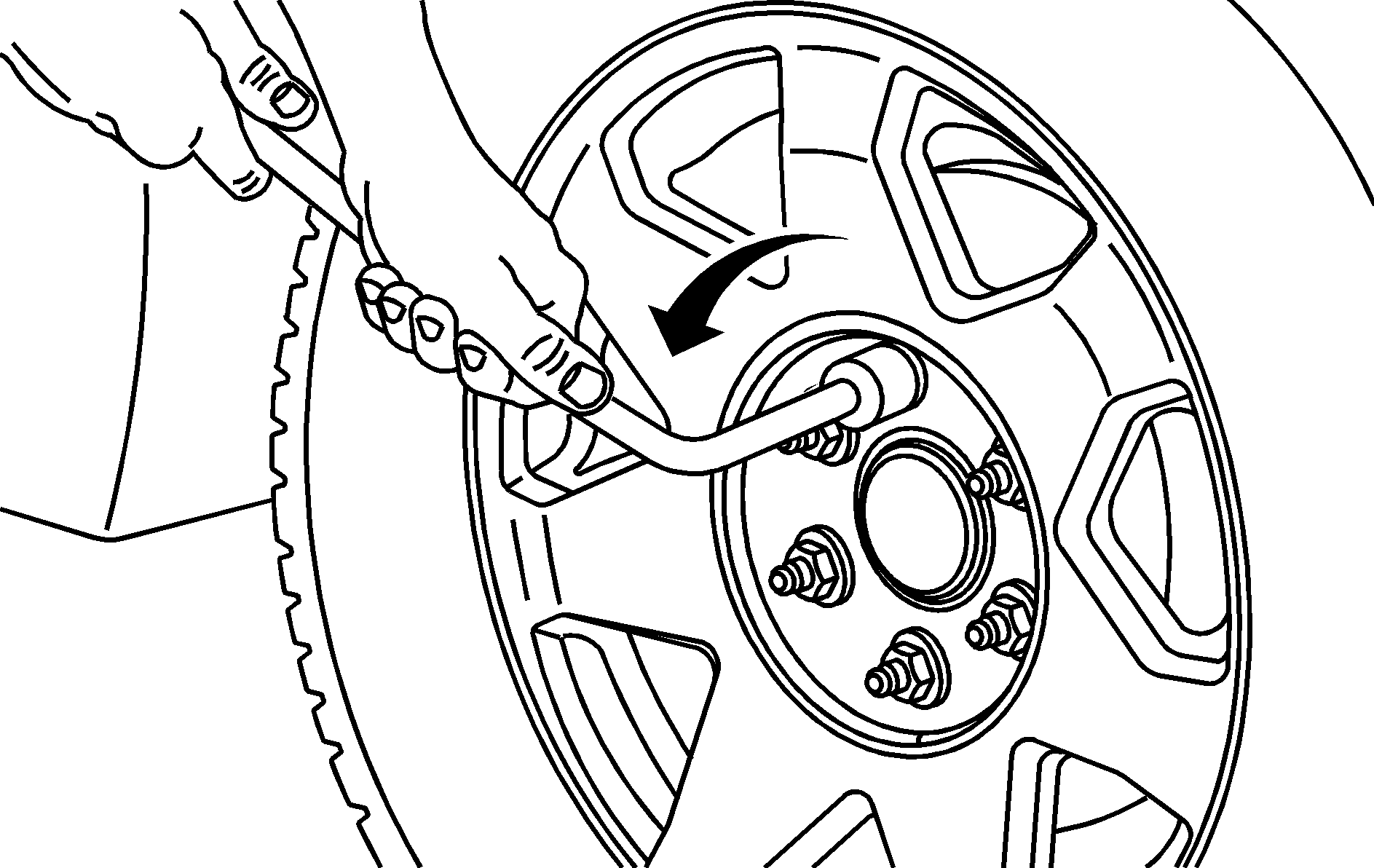
Jack Positions (overall view)
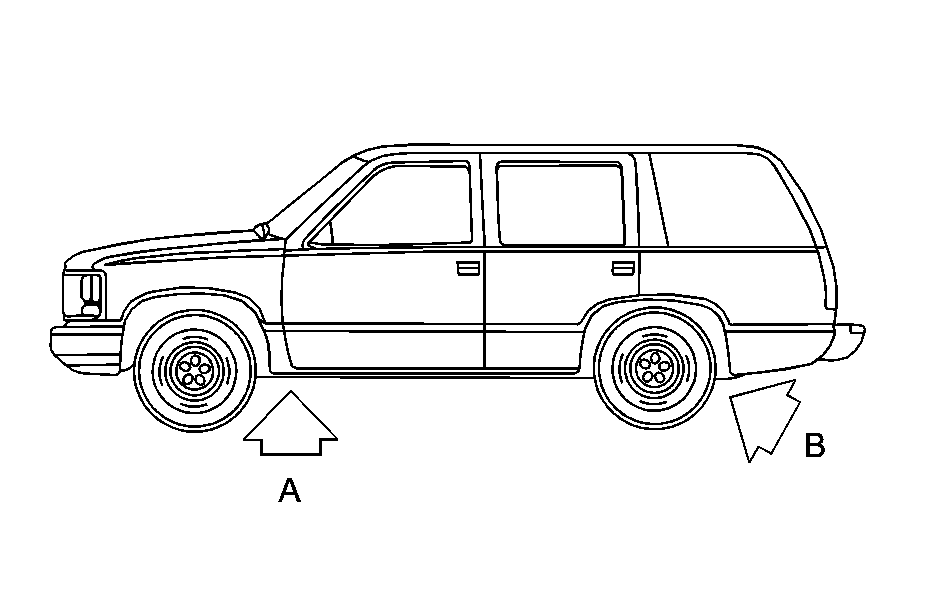
B: Rear Position
These locations are the general area of jack placement. See text and art following for the exact jack placement.
Caution: Getting under a vehicle when it is jacked up is dangerous. If the vehicle slips off the jack you could be badly injured or killed. Never get under a vehicle when it is supported only by a jack.
Caution: Raising your vehicle with the jack improperly positioned can damage the vehicle and even make the vehicle fall. To help avoid personal injury and vehicle damage, be sure to fit the jack lift head into the proper location before raising the vehicle.
Front Position
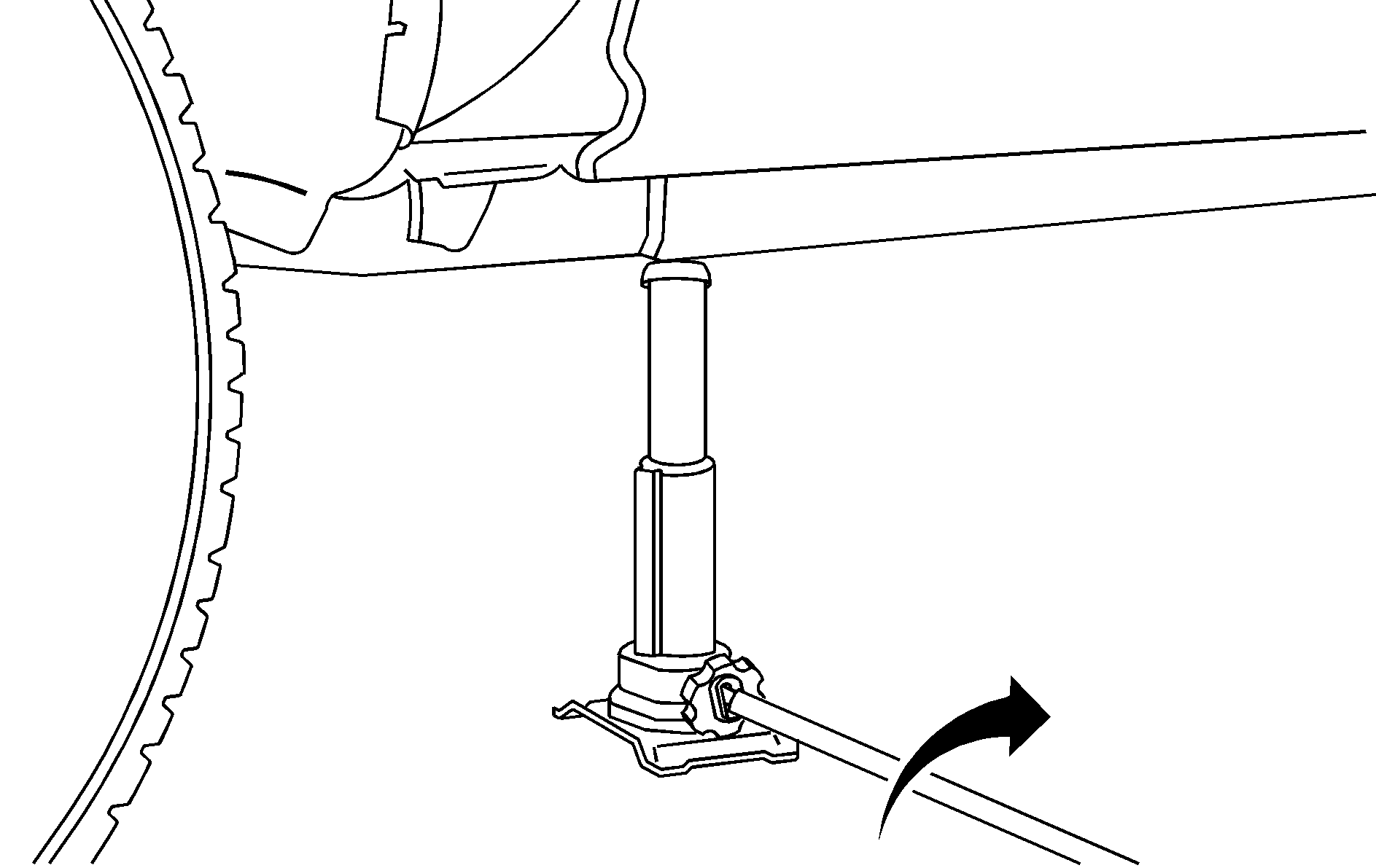
Rear Position
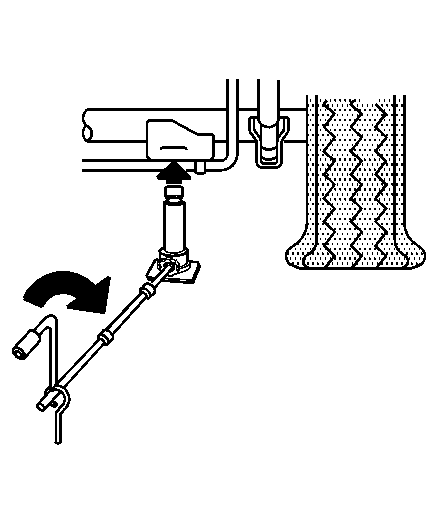
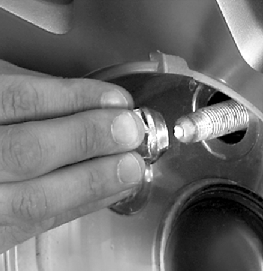
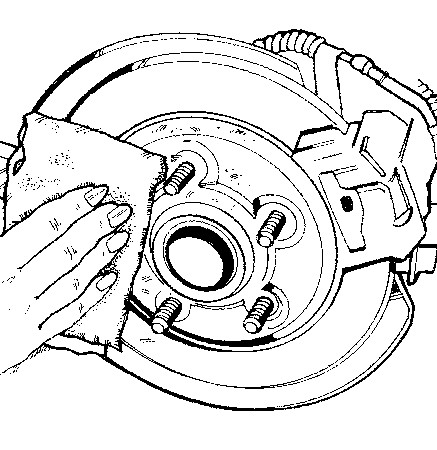
Caution: Rust or dirt on a wheel or other parts to which it is fastened, can make the wheel nuts become loose and eventually the wheel could come off and cause a crash. Always remove all rust and dirt from wheels and other parts.
Caution: Never use oil or grease on bolts or nuts because the nuts might come loose. The vehicle's wheel could fall off, causing a crash.
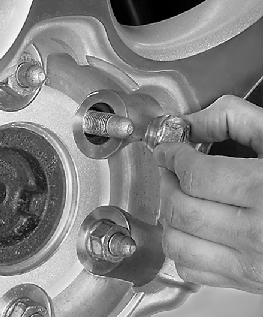
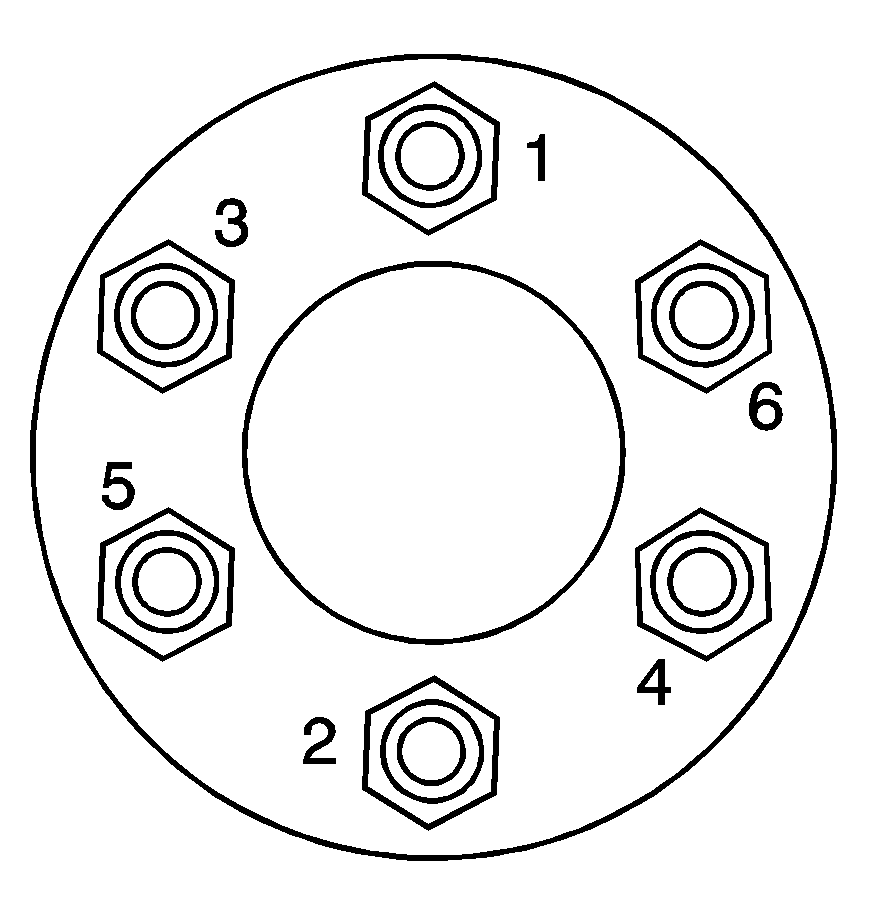
Caution: Wheel nuts that are improperly or incorrectly tightened can cause the wheels to become loose or come off. The wheel nuts should be tightened with a torque wrench to the proper torque specification after replacing. Follow the torque specification supplied by the aftermarket manufacturer when using accessory locking wheel nuts. See Capacities and Specifications for original equipment wheel nut torque specifications.
Notice: Improperly tightened wheel nuts can lead to brake pulsation and rotor damage. To avoid expensive brake repairs, evenly tighten the wheel nuts in the proper sequence and to the proper torque specification. See Capacities and Specifications for the wheel nut torque specification.
When you reinstall the regular wheel and tire, you must also reinstall the center cap. Place the cap on the wheel and tap it into place until it seats flush with the wheel. The cap only goes on one way. Be sure to line up the tab on the center cap with the indentation on the wheel.
Storing a Flat or Spare Tire, Jack and Tools
Caution: Storing a jack, a tire, or other equipment in the passenger compartment of the vehicle could cause injury. In a sudden stop or collision, loose equipment could strike someone. Store all these in the proper place.
Notice: Storing an aluminum wheel with a flat tire under your vehicle for an extended period of time or with the valve stem pointing up can damage the wheel. Always stow the wheel with the valve stem pointing down and have the wheel/tire repaired as soon as possible.
Store the tire under the rear of the vehicle in the spare tire carrier. Use the art and text following to help you:
-

Spare Tire (Valve Stem Pointed Down)
Hoist Assembly
Hoist Cable
Tire Retainer
Hoist Shaft
Hoist End of Extension Tool
Hoist Shaft Access Hole
Wheel Wrench
Jack Handle Extensions
Hoist Lock (If Equipped)
- Put the tire on the ground at the rear of the vehicle with the valve stem pointed down.
- Tilt the retainer (D) downward and through the wheel opening. Make sure the retainer is fully seated across the underside of the wheel.
- Attach the wheel wrench (H) and extensions (I) together.
- Insert the hoist end (F) through the hole (G) in the rear bumper and into the hoist shaft.
- Raise the tire part way upward. Make sure the retainer is seated in the wheel opening.
- Raise the tire fully against the underside of the vehicle by turning the wheel wrench clockwise until you hear two clicks or feel it skip twice. You cannot overtighten the cable.
- Make sure the tire is stored securely. Push, pull, and then try to rotate or turn the tire. If the tire moves, use the wheel wrench to tighten the cable. Reinstall the spare tire lock (if equipped).



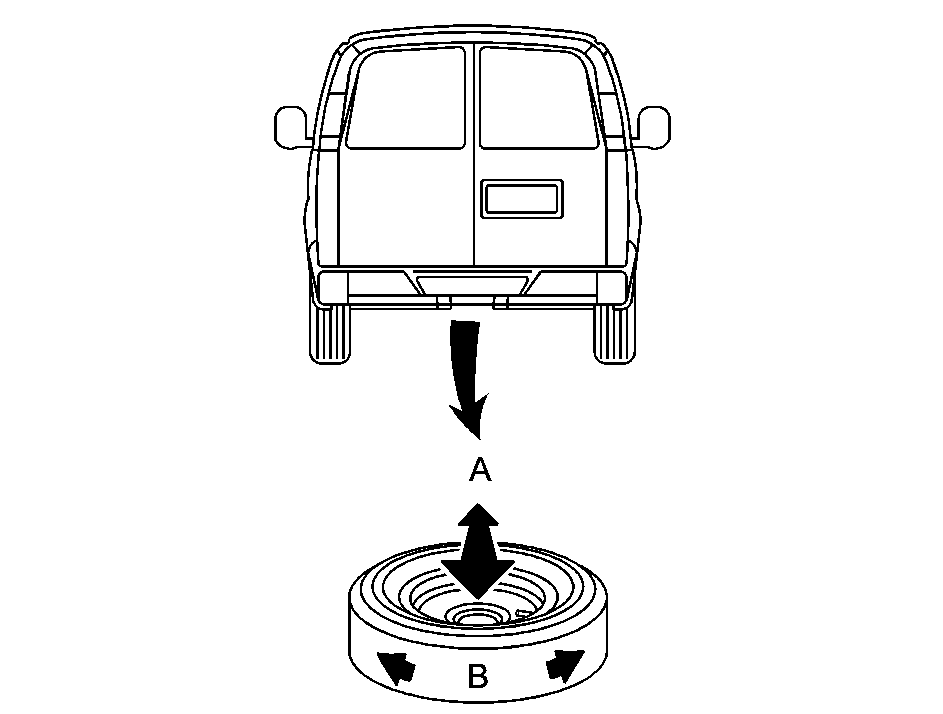
Push and Pull
Rotate Tire
To store the jack and tools, follow these procedures:
For Yukon Denali, do the following:
- Put the tool kit, with the jack tools and gloves, in the tool bag and place in the retaining clip above the jack.
- Tighten down with the wing nut.
- Then, assemble wheel blocks and bottle jack together with the wing nut and retaining hook.
- Position jack behind the jack storage cover in the left rear side panel and tighten, adjusting clockwise until the jack is secured tight in the mounting bracket. Be sure to position the holes in the base of the jack onto the pin in the mounting bracket.
For Yukon XL Denali, do the following:
- Return the tool kit (jack tools and gloves) to the tool bag.
- Assemble wheel blocks and bottle jack together with the wing nut and retaining hook.
- Position under the jack storage tray in the left rear side panel below the wheelbase and tighten, adjusting clockwise until the jack is secured tight in the mounting bracket. Be sure to position the holes in the base of the jack onto the pin in the mounting bracket.
- Use the retaining clip to fasten the tool kit on the stud in the storage compartment in the rear left trim panel and turn the wing nut clockwise to secure.
- Return the storage tray.
-
Yukon Denali (Rear Access Panel)

Tool Kit with Jack Tools and Gloves
Retaining Bracket and Wing Nut
Wing Nut Holding Wheel Blocks
Wheel Blocks
Bottle Jack
-
Yukon XL Denali

Bottle Jack
Wheel Blocks
Wing Nut Holding Wheel Blocks
Mounting Bracket
Removable Tray
Retaining Hook
Retaining Bracket and Wing Nut
Tool Kit with Jack Tools and Gloves
Secondary Latch System
Your vehicle has an underbody mounted tire hoist assembly equipped with a secondary latch system. It's designed to stop the spare tire from suddenly falling off your vehicle. For the secondary latch to work, the spare must be installed with the valve stem pointing down. See "Storing a Flat or Spare Tire, Jack and Tools" earlier in this section.
Caution: Before beginning this procedure read all the instructions. Failure to read and follow the instructions could damage the hoist assembly and you and others could get hurt. Read and follow the instructions listed next.
To release the spare tire from the secondary latch do the following:
- Check under the vehicle to see if the cable end is visible.
- If the cable is not visible proceed to Step 6.
- Loosen the cable by turning the wrench counterclockwise three or four turns.
- Repeat this procedure at least two times. If the spare tire lowers to the ground, continue with Step 5 of "Removing the Spare Tire and Tools" earlier in this section.
- Turn the wrench counterclockwise until approximately six inches (15 cm) of cable is exposed.
- Stand the wheel blocks on their shortest ends, with the backs facing each other.
- Place the bottom edge of the jack on the wheel blocks, separating them so that the jack is balanced securely.
- Attach the jack handle, extension, and wheel wrench to the jack and place it (with the wheel blocks) under the vehicle towards the front of the rear bumper. Position the center lift point of the jack under the center of the spare tire.
- Turn the wrench clockwise to raise the jack until it lifts the end fitting.
- Continue raising the jack until the spare tire stops moving upward and is held firmly in place. The secondary latch has released and the spare tire is balancing on the jack.
- Lower the jack by turning the wheel wrench counterclockwise. Keep lowering the jack until the spare tire slides off the jack or is hanging by the cable.
- Disconnect the jack handle from the jack and carefully remove the jack. Use one hand to push against the spare while firmly pulling the jack out from under the spare tire with the other hand.
- Tilt the retainer (D) at the end of the cable and pull it through the wheel opening. Pull the tire out from under the vehicle.
- If the cable is hanging under the vehicle, turn the wheel wrench in the hoist shaft hole in the bumper clockwise to raise the cable back up.
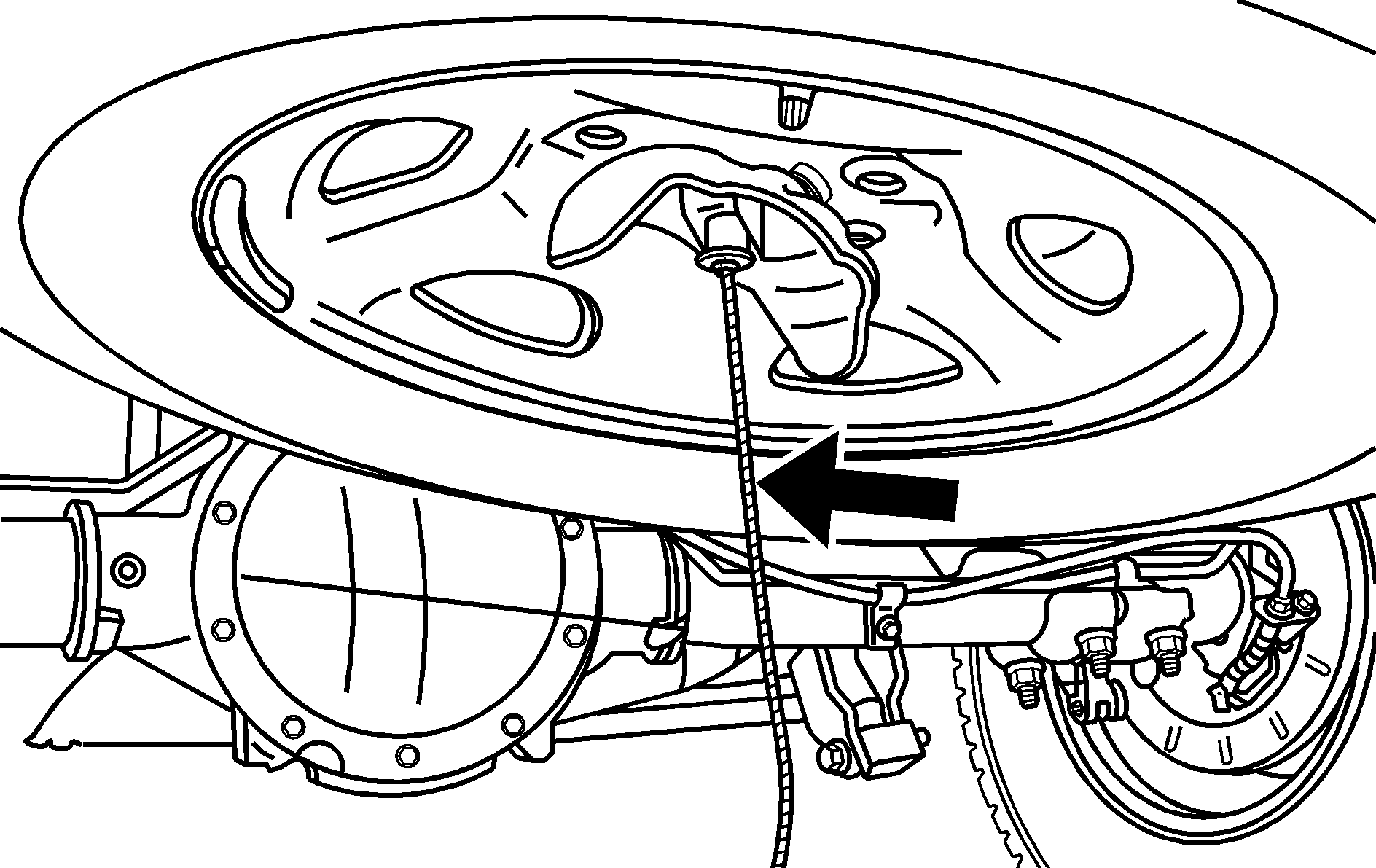
If it is visible, first try to tighten the cable by turning the wheel wrench clockwise until you hear two clicks or feel it skip twice. You cannot overtighten the cable.
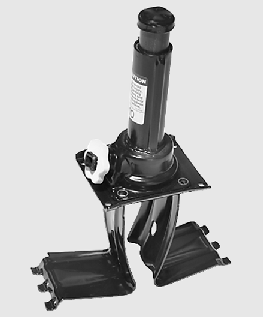
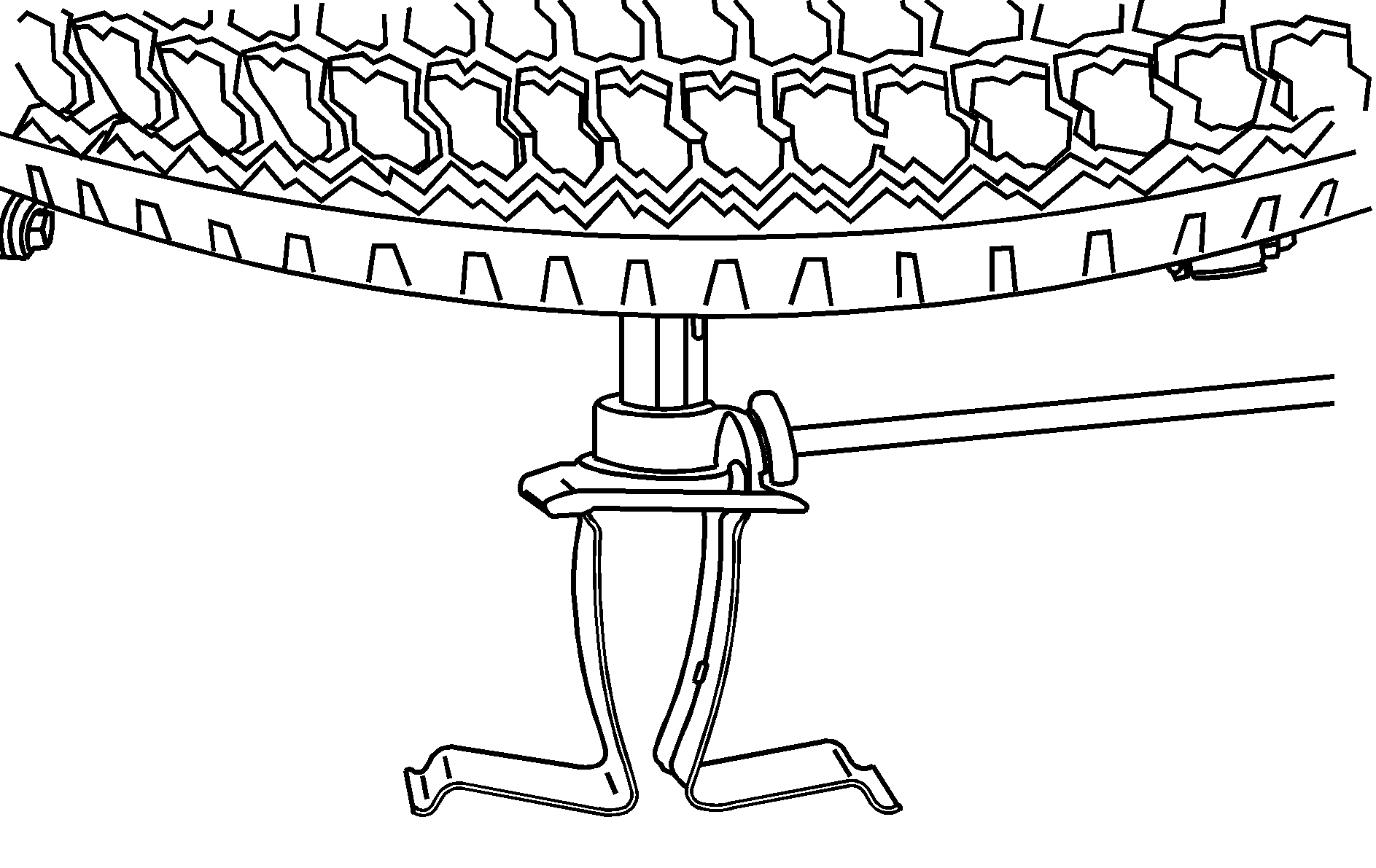
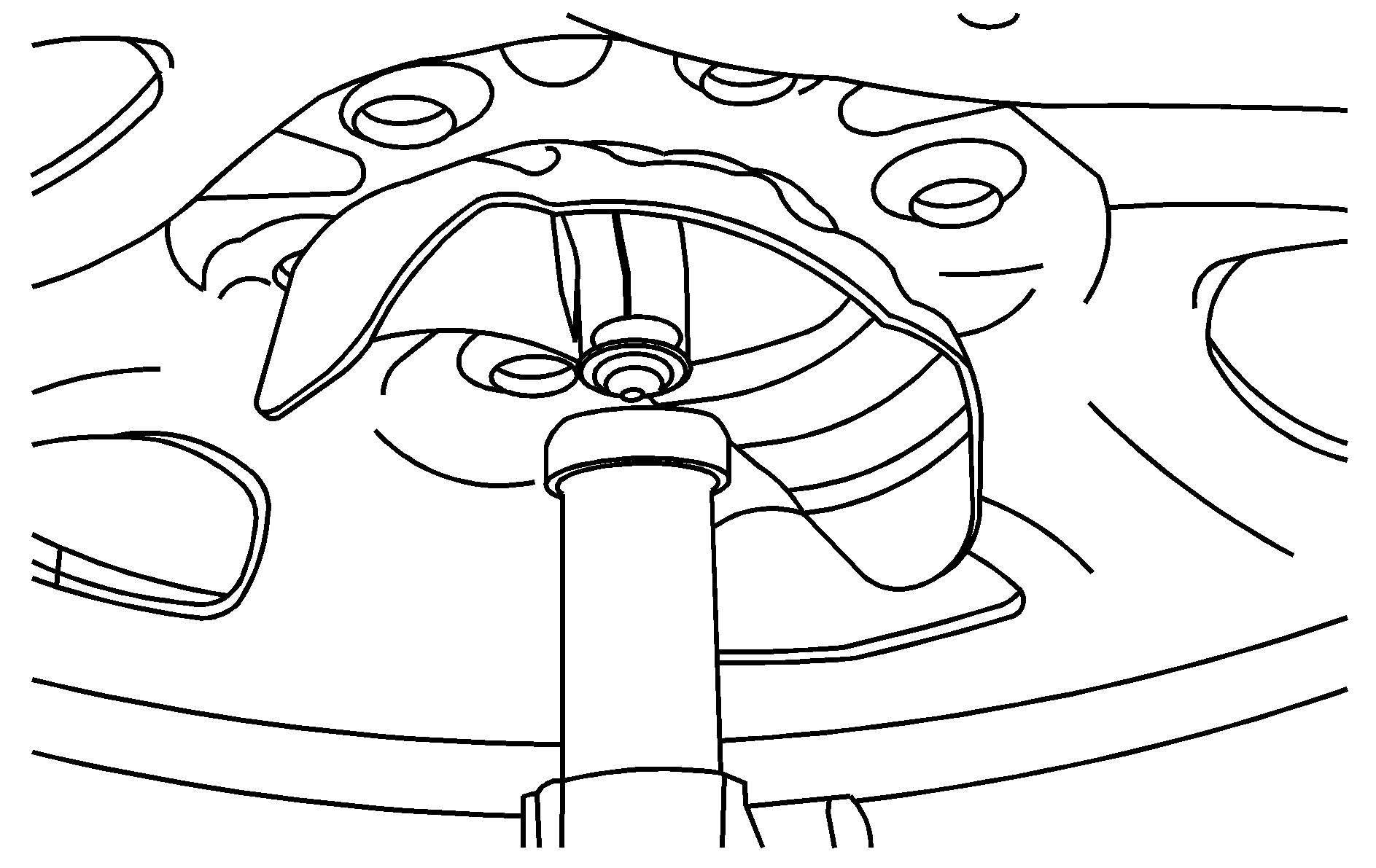
Caution: Someone standing too close during the procedure could be injured by the jack. If the spare tire does not slide off the jack completely, make sure no one is behind you or on either side of you as you pull the jack out from under the spare.
If the spare tire is hanging from the cable, insert the hoist handle, extension and wheel wrench into the hoist shaft hole in the bumper and turn the wheel wrench counterclockwise to lower the spare the rest of the way.

Have the hoist assembly inspected as soon as you can. You will not be able to store a spare or flat tire using the hoist assembly until it has been replaced.
To continue changing the flat tire, see "Removing the Flat Tire and Installing the Spare Tire" earlier in this section.
